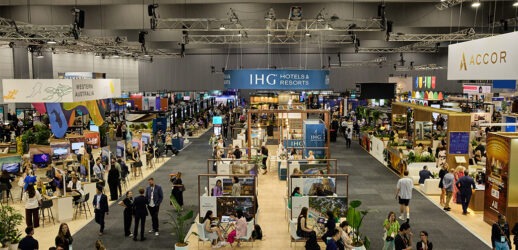We will be traveling and meeting again. That’s the uber message delivered by Jan Freitag, senior vice president at STR, which collects market data on the hotel industry, during a webinar hosted by Adara, a Palo Alto, California-based travel intelligence company.
“The industry is resilient. We will rebound,” Freitag predicts. “It’s going to be painful tomorrow, but then things will get to the ‘next normal.’” To those who say Zoom meetings might become the permanent replacement for F2F, he replies: “You’re all suffering from ‘recency bias.’ You think what’s happening now will happen forever. After 9/11, a lot of people said no one would fly again. There’s a high likelihood that we will meet in large groups again.”
In his long-term optimism Freitag is not alone. Equally interesting are his insights into the present travel landscape.
“If you have a beach or a mountain, you’re doing all right now,” he says. “Idaho and Montana have done really well this summer, and so has Florida and Colorado—because there is the perception that they offer wide-open distances.”
It’s the downtown urban centers that are hurting most. “There’s no group demand,” Freitag says. “It’s economy over full-service hotels, drive-to over fly-to, rural over urban. Upper-upscale hotels are registering only 30 percent occupancy. Extended-stay properties are seeing occupancy in the 70 percent range.”
Freitag says he’s been impressed with the proactive way hotel companies have created and promoted new hygiene standards and protocols—and by the way they have even begun to create new market niches. “Like making the pitch that people work from a hotel room down the road. That’s was never on anybody’s plan before,” he says. “We may also see extended vacation or weekend travel, because remote workers and their Zoom-schooled kids can be anywhere.”
Over the past three months, STR’s hotel data “has gotten consecutively better,” Freitag says. “April was the worst ever recorded. July was down only 53 percent, and August was 42 percent down, year over year.” He thinks this trend will continue.
At the same time, he’s seeing a decline in new hotel rooms being built, and expects that trend to extend, as well. “Hotel projects in final planning will stay in final planning and will not break ground, with some exceptions,” he says.
The resumption of business travel, including for meetings, will likely be segmented, Freitag predicts. “If you’re a small company, it’s more likely. The boss might say, ‘Let’s give it a try.’ But if you’re the CEO of Microsoft, you’re also the chief risk officer”—and therefore less likely to green light a return to the road when lawsuits and a dip in shareholder value could be on the horizon.
What has Freitag learned about himself over the past six months? “I’m not missing travel as much as I thought,” he responds. “I think I will go to the other side of this pretty soon, where I need to go out. But not to fly across the country for an hour’s meeting. I think we’ll be more discerning when we put ourselves onto a plane or into a ballroom.”




